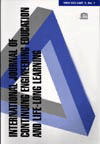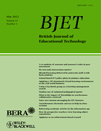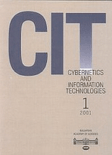
International Journal of Artificial Intelligence in Education
metrics 2024
Transforming Education with Groundbreaking AI Discoveries
Introduction
International Journal of Artificial Intelligence in Education, published by SPRINGER, stands at the forefront of research in the interdisciplinary fields of artificial intelligence, education, and e-learning. With an impact factor that reflects its prestigious standing, this journal is categorized in the Q1 quartile for both Computational Theory and Mathematics and Education, as well as E-learning, making it an essential resource for scholars and practitioners alike. Founded in 2000, this journal not only disseminates cutting-edge research but also facilitates critical discussions on the implications of AI technologies in educational contexts. Featuring a robust Scopus rank within the top percentile for relevant fields, thereby highlighting its influence and reach, the journal provides a platform for innovative findings that shape the future of teaching and learning. Researchers and educators interested in advancing the integration of AI into educational systems will find this journal a vital source of knowledge and insight.
Metrics 2024
 1.84
1.84 4.70
4.70 4.70
4.70 62
62Metrics History
Rank 2024
Scopus
IF (Web Of Science)
JCI (Web Of Science)
Quartile History
Similar Journals

International Journal of Continuing Engineering Education and Life-Long Learning
Advancing Knowledge for Lifelong Engineering Excellence.Welcome to the International Journal of Continuing Engineering Education and Life-Long Learning, a peer-reviewed scholarly journal committed to advancing the discourse in the fields of education, e-learning, and engineering. Published by InderScience Enterprises Ltd in the United Kingdom, this journal serves as a vital resource for researchers, educators, and professionals seeking to explore innovative approaches to lifelong learning and continuing education within engineering disciplines. With an ISSN of 1560-4624 and an E-ISSN of 1741-5055, the journal reflects an ongoing commitment to academic rigor, featuring contributions that span from 1986 to the present. Although classified in the fourth quartile of Scopus rankings in both education and engineering categories, the journal embraces the evolving landscape of technological integration in education, offering a platform for the dissemination of cutting-edge research and practical applications. We invite you to delve into the insightful articles that strive to equip engineering professionals with the knowledge necessary to maintain relevance in an ever-changing world.

E-Learning and Digital Media
Fostering collaboration between education and technology.E-Learning and Digital Media, published by SAGE Publications Inc, is a premier academic journal dedicated to the innovative intersection of digital technologies and education. With a strong commitment to advancing research in the fields of education and computer science, this journal has established itself as a vital resource for researchers, professionals, and students alike. As of 2023, it proudly holds a Q2 ranking in both Computer Science Applications and Education, reflecting its impact and reach within the academic community. The journal encompasses a wide range of topics exploring the effectiveness and applications of e-learning technologies, pedagogical strategies, and digital media in educational settings. Since its inception in 2009, E-Learning and Digital Media has continuously contributed to the understanding and development of digital education, ensuring relevancy in an ever-evolving landscape. With an open access model intended to foster accessibility and dissemination of knowledge, this journal invites submissions that push the boundaries of traditional education through cutting-edge research and practice.

Education and Information Technologies
Empowering learning with innovative insights.Education and Information Technologies, published by SPRINGER, is a leading journal dedicated to the intersection of educational practices and innovative information technologies. With an impressive impact factor and consistently ranked in the Q1 quartile across Education, E-learning, and Library and Information Sciences, this journal serves as an essential resource for researchers and professionals aiming to explore the dynamic landscape of educational technology. Spanning from 1996 to 2024, it provides a platform for high-quality, peer-reviewed articles that contribute to the evolving discourse in this critical field. The journal’s rigorous Scopus ranking, placing it in the top 4% of Social Sciences Education and top 6% in Library and Information Sciences, highlights its significance in advancing scholarly knowledge. While it offers various access options, the focus remains on delivering cutting-edge research that can inform teaching practices and technological integration in education, making it indispensable for students, educators, and technology developers alike.

BRITISH JOURNAL OF EDUCATIONAL TECHNOLOGY
Pioneering Research for Tomorrow's ClassroomsBRITISH JOURNAL OF EDUCATIONAL TECHNOLOGY, published by Wiley, is a leading journal in the field of educational technology, recognized for its commitment to advancing research and practice in this dynamic arena. With an impressive impact factor that places it in the Q1 quartile for both Education and E-learning in 2023, it serves as a critical resource for academics, practitioners, and policymakers alike. This journal, with an established publication history since 1970, focuses on the integration of technology in educational settings, aiming to disseminate innovative findings and facilitate discussions that enhance learning experiences. Researchers contributing to the journal address diverse topics from digital learning environments to the pedagogical implications of emerging technologies, ensuring comprehensive coverage of the latest trends and methodologies. Submissions are welcomed in various formats, promoting collaborative scholarly dialogue in fostering effective educational practices. Access to the journal is available through traditional subscription frameworks, ensuring broad accessibility for institutions and individuals invested in the advancement of educational technology.

Machine Intelligence Research
Transforming Ideas into Impactful SolutionsMachine Intelligence Research is a premier academic journal published by SPRINGERNATURE, dedicated to advancing knowledge in the rapidly evolving fields of Artificial Intelligence, Applied Mathematics, and more. With its ISSN 2731-538X and E-ISSN 2731-5398, the journal is recognized for its impact, holding a distinguished position in various Q1 categories for 2023, including Computer Vision and Pattern Recognition and Control and Systems Engineering. Operating under an Open Access model, it ensures that groundbreaking research from China and around the world remains accessible to a global audience, promoting collaboration and innovation. As a beacon for researchers, professionals, and students, Machine Intelligence Research aims to disseminate high-quality research findings, innovative methodologies, and influential theories, thereby shaping the future landscapes of science and technology.

Frontiers in Artificial Intelligence
Connecting Minds in the Realm of AIFrontiers in Artificial Intelligence, published by FRONTIERS MEDIA SA, is a pioneering open-access journal that commenced in 2018, dedicated to advancing the multifaceted field of artificial intelligence. With an impressive Q2 ranking in the category of Artificial Intelligence, it occupies a significant position within the academic community, offering a platform for high-quality, peer-reviewed research. The journal's comprehensive scope encompasses a variety of subfields, including machine learning, robotics, and human-computer interaction, making it an invaluable resource for researchers, professionals, and students alike. As an open-access journal since 2019, it ensures that cutting-edge research is readily available to a global audience, facilitating knowledge sharing and collaboration. With its headquarters in Switzerland and a commitment to scholarly excellence, Frontiers in Artificial Intelligence is at the forefront of the scientific discourse, empowering the next generation of innovations in AI.

Smart Learning Environments
Revolutionizing education with cutting-edge insights.Smart Learning Environments, published by Springer Heidelberg, is a leading open-access journal dedicated to advancing the field of educational technology and intelligent learning systems. Since its inception in 2014, this journal has established itself as a vital resource for researchers and practitioners, showcasing innovative interdisciplinary approaches that enhance learning experiences using smart technologies. With a notable impact factor and recognition in the top quartiles (Q1) of both Computer Science Applications and Education, it ranks within the top 2% of journals in the Social Sciences – Education category and the top 7% in Computer Science, according to Scopus. The journal's scope encompasses empirical studies, theoretical papers, and reviews, making it an essential platform for disseminating cutting-edge research. Researchers, educators, and technology professionals are encouraged to engage with this premier outlet, which not only facilitates access to high-quality research but also promotes collaboration across academic and professional spheres.

International Arab Journal of Information Technology
Fostering Innovation Across Arab Tech LandscapesWelcome to the International Arab Journal of Information Technology, a prestigious publication under the aegis of ZARKA PRIVATE UNIVERSITY in Jordan, dedicated to advancing the field of Information Technology. First established in 2008, this journal has made significant strides in disseminating high-quality research, achieving an impressive Q2 ranking in Computer Science (miscellaneous) and securing a notable 57th percentile position in the Scopus rankings. With a comprehensive scope encompassing various sub-disciplines of computer science, the journal is committed to promoting scholarly dialogue and innovation among researchers, professionals, and students. While currently operating as a subscription-only journal, it remains a vital resource for the academic community seeking to explore the latest trends and advancements in technology. The International Arab Journal of Information Technology is not only a platform for original research but also a vibrant hub for ideas that shape the technological landscape of the Arab region and beyond.

Cybernetics and Information Technologies
Bridging Disciplines in Cybernetics and Computer ScienceCybernetics and Information Technologies is a pivotal academic journal, published by the Institute of Information and Communication Technologies at the Bulgarian Academy of Sciences. With its Open Access policy established since 2012, this journal facilitates wide dissemination of cutting-edge research across the field of computer science, particularly in the intersections of cybernetics and information technology. Indexed in Scopus, it holds a commendable position within the Q3 quartile for 2023, ranking #103 of 232 in the category of General Computer Science, placing it within the 55th percentile and attesting to its growing influence among peer publications. The journal not only aims to publish high-quality research but also seeks to foster a collaborative platform for academicians, practitioners, and students to advance the domain of computational technologies. With a focus on innovative methodologies and applications, Cybernetics and Information Technologies remains committed to addressing current challenges and exploring the future landscape of technology and information systems.

Electronic Journal of e-Learning
Bridging Theory and Practice in e-Learning ExcellenceElectronic Journal of e-Learning is a prominent peer-reviewed publication dedicated to the exploration and dissemination of advancements in the fields of e-learning, computer science applications, and educational technologies. Published by ACAD CONFERENCES & PUBL INT LTD since 2003 as an open-access journal, it facilitates the free exchange of knowledge, ensuring researchers, educators, and practitioners have unrestricted access to cutting-edge research and innovative practices. With an impressive impact factor reflecting its influence, the journal has achieved a Q2 ranking in both Computer Science Applications and Education for 2023, placing it among the top-tier journals in its field. The Electronic Journal of e-Learning serves as a crucial platform for scholarly discussions, helping to shape the future of educational practices and technology integration. As it converges from 2011 to 2024, the journal continues to invite submissions that advance the understanding and application of e-learning strategies across varied educational contexts.